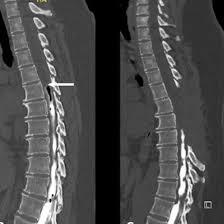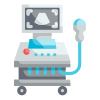Fill out form to enquire now
CT Myelogram
Medintu has collaborated with the best pathology laboratories that are NABL and NABH certified and follow ISO safety guidelines to provide the best CT Myelogram at an affordable price for needy individuals. A CT myelogram is an additional type of diagnostic test that is basically an integration of a CT examination and a contrast medium, which is injected into the spinal canal. This procedure is employed when more details of the spinal cord, nerves and tissues around the spine cannot be seen very well by using the standard MRI or X-ray. During the procedure, a radiologist uses a special fluid called contrast dye in the cerebrospinal fluid around the spinal cord, often through a spinal tap. After having taken the dye, the patient has a CT scan which provides detailed cross-sectional images of the spine. The contrast agent assists in making differences noticeable which include: Herniated discs, spinal stenosis, tumors or infections among others. CT myelograms are most useful in the diagnosis of diseases involving the spinal canal and nerve roots since the test offers better imaging than MRI. The test is usually harmless, though the presence of a needle and exposure to radiation produces certain risks. Top management commonly reminds patients that they should not move during the scan to acquire clear pictures. To schedule an appointment for a CT Myelogram, simply contact Medintu or call our customer care at +919100907036 or +919100907622 for more details and queries.
What is a CT Myelogram?
A CT myelogram is a unique type of examination in which CT scan is combined with myelography, which involves injecting contrast material into the spinal canal. With this technique, spinal physicians can get clearer images of extensions of the spinal cord, roots of nerves and the tissues neighboring the spinal cord, making assessment of several conditions affecting the spine. Contrast material is introduced into the spinal canal using a small needle usually in the lower back over the spinal cord in the cerebrospinal fluid. This helps to improve the visualization of the spinal structures in the CT images that will be made from it. Following strained contrast, the patient has a CT scan done on him or her. CT involves in taking a number of cross-sectional images in different planes of the spine to see all aspects of the spinal canal. CT myelography’s main applications involve the Following Identifying herniated discs that may be pinching on nerve roots, Determining spinal canal stenosis that may be putting pressure on nerves, Detecting tumor formations touching on the spinal cord or nerves, Diagnosing conditions that include meningitis or abscesses. The ability of CT myelography to demonstrate theatomic structure of the spine is better than a standard CT scan or MRI in some cases and can be used instead of MRI if the later is contraindicated due to the presence of metals in the body such as a metal implant. It enables actual view of the anatomy and pathology of the spine therefore facilitating diagnosis and treatment.
Indications for a CT Myelogram
CT myelography is done in several circumstances where imaging of the spinal cord and nerve root is needed. Here are some common indications:
- Herniated Discs
To determine the degree of disc herniation that may be squeezing nerve trunks and giving pain or other symptoms.
- Spinal Stenosis
Assessment of the spinal canal diameter reduction or nerve root canal, useful in determining the presence of nerve compression, and the relevant signs.
- Tumors or Lesions
Identification and description of any neoplastic processes that arise within the spinal canal and may impinge upon the spinal cord or nerve roots.
- Nerve Root Compression
Cohort analysis of situations that result in entrapment of nerves mainly from the brachial or lumbar plexus that manifests symptoms in the limbs that include pain, weakness and or numbness.
- Post-Surgical Evaluation
Whenver spinal surgery is performed, the state of the spinal canal and nerve issues have to be evaluated to determine presence of complications such as scar tissue or recurrent herniation.
- Infections or inflammation of the skin, ear, nose, eyes and throat.
Monitoring of infections such as abscesses, or meningitis or inflammatory conditions involving spinal cord or any adjacent tissue.
- Congenital Anomalies
Exploring spinal malformations which can either impair the function or structure of the spine at birth.
- This is where inexplicable neurological signs come into play.
Determination of the cause of symptoms indicated over structural diseases especially in cases that do not require other imaging methods.
- Assessment of Spinal Trauma
Imaging has been used when there are suspicions of traumas in the spinal area as well as suspicion of involvement of the spinal cord or the nerve roots.
Procedure Overview
- Preparation
Clothing: In the process of testing, the patient may be required to put on some clothes, and they are required to wear a gown, also any items such as rings, glasses or chains that may affect imaging are removed.
Medical History: A patient should report any allergies (and specifically contrast dye allergies), current medications, and prior procedures that used contrast to his or her healthcare provider.
Dietary Restrictions: In some cases, depending on the type of scan, patients are advised to fast before the procedure often for several hours.
- Arrival at the Imaging Center
Go along to the centre with the letters where through them you turn in any documents or identification that may be required.
By the time the test is about to be carried out, the technologist will make sure to enlighten the patient on every detail that he or she has to undergo.
- During the Scan
Positioning: During the CT scan the patient is on a slim couch, mostly on the back side, with the right shoulder in the middle of the CT scanner.
Immobilization: This may require a patient to remain as immobile as possible and straps or pillows may be used to help into position.
Scanning Process: They slowly slide the table along the opening that is in the form of a circle of the CT machine. Taking pictures in different positions, the X-ray tube revolves around the shoulder as the pictures are taken.
Breath-Holding: They may tell the patient to hold the breath for sometime during the scanning to avoid image distortion caused by breathing.
- Utilization of Contrast (if possible)
Now and then, a contrast agent may be administered through a vein to escalate the images produced by this procedure. Adverse reactions that are usually associated with a drug induced allergic reaction will also be checked.
- Duration
The whole process usually can take from 15 to 30 minutes, and if it is necessary doing a contrast the time can increase.
- After the Scan
It is normally all right for patients to perform their routine activities the very next day after the treatment, if not restricted otherwise.
If contrast was administered, patients would perhaps be for a brief duration to prevent dangerous side effects.
- Results
All the images taken will be examined by a radiologist who will prepare a report to the attending doctor, who in turn will explain to the patient.
Benefits of CT Myelography
General advantages of CT myelography include the following; Here are some key advantages:
- Detailed Imaging
CT myelography gives detailed images of the spinal cord, nerve roots and tumorConfiguration in relation to adjacent structures.
- Enhanced Visualization
Contrast dye enhances the lights up the spinal canal as well as nerves and so it becomes easier to diagnose conditions such as herniated discs or tumors.
- Rapid Procedure
This procedure is fast and can take not more than an hour, and it makes it easy to diagnose and plan for treatment.
- Effective for Certain Cases
The major advantage of CT myelography is as a complementary method for patients who cannot be examined by MRI because of metal prostheses, pacemakers, etc.
- Comprehensive Assessment
This technique can assess multiple spinal levels and show that problems which cannot be observed under the CT or MRI evaluation only can exist.
- Guidance for Treatment
Such detailed images can be useful in planning organ surgery because it ensures that the surgeon lays the correct strategy and steps to surgery.
- Non-Invasive Approach
Although making a needle aperture for the contrast escaping, this myelography is less invasive compare with open surgeries.
- The Importance of Diagnosis of Different Illnesses
MRI is useful in identifying most spinal pathologies namely; disc herniation, stenosis, tumors, infection and congenital anomalies.
- Quick Recovery
It is usually less invasive and most patients do not have to take long off work at all after the procedure.
- Improved Patient Outcomes
This paper deems that decreased diagnostic uncertainty and improved targeting of interventions directly derived from precision enhanced by CT myelography contribute positively towards patient health.
- Test Type: CT Myelogram
- Preparation:
- Wear a loose-fitting cloth
- Stop eating six hours before your test
- Carry Your ID Proof
- Prescription is mandatory for patients with a doctor’s sign, stamp, with DMC/HMC number; as per PC-PNDT Act
- Reports Time: With in 3-4 hours
- Test Price: Rs.6000
How can I book an appointment for a CT Myelogram through Medintu?
To schedule an appointment for a CT Myelogram, simply contact Medintu or call our customer care at +919100907036 or +919100907622 for more details and queries.
What is a CT myelogram?
A CT myelogram is a specialized scan that bring together the use of functional CT and injection of contrast materials into the vertebral canal to detail out the spinal cord and/or nerve roots.
For what purposes is a CT myelogram necessary?
CT myelography is usually done as a means of diagnosing conditions such as herniated disc, spinal stenosis, tumors and nerve root compression where MRI is not feasible.
What should I expect to do before the procedure?
Depending on the specifics of the procedure you may be asked to wear a hospital gown; you may be told not to eat or drink prior to the operation; you may need to inform your doctor whether you are allergic to certain medications and so on.
Is the procedure painful?
You may feel some discomfort during the needle insertion into the vein to deliver the contrast you may feel some discomfort but the doctor will use anesthetic agent to lessen the pain.
Will I need contrast dye?
Yes, a contrast agent is required to make the structures in the spine well seen during the CT scan.
What can I anticipate during the CT myelogram?
Lying face down on a table, after the contrast substance has been introduced, you will also be taken through CT scan while immobile. The treatment usually lasts 30-60 minutes.
What are some of the complications likely to occur in CT myelography?
Possible side effects include an allergic reaction to the injected dye, infection at the site of the injection, discomfort or headache after the procedure.
How long should one expect to wait for the results?
A radiologist will review the images and a report will be forwarded to the attending physician who referred you for the test, the results should be ready within a day or two.
What sort of activites am I allowed to carry out after the operation?
With ambulatory (outpatient) procedures, many patients can return to their daily routines immediately after the procedure, although you may be advised to take it easy for a few hours and to increase your fluid intake.
Why Choose Medintu for CT Myelogram?
Medintu is an online medical consultant that provides home-based medical services not only in your area but also in most cities in India, including Hyderabad, Chennai, Mumbai, Kolkata, and more. We have collaborated with diagnostic centers that have the best machines and equipment to ensure you get accurate results. Medintu provides 24-hour customer service for booking the appointment of the services and guides you with instructions. Medintu also provides the best diagnostic centers at low prices. Once you receive your test results, you can easily book an appointment with our network of experienced doctors for consultation. To schedule an appointment for a CT Myelogram, simply contact Medintu or call our customer care at +919100907036 or +919100907622 for more details and queries.





